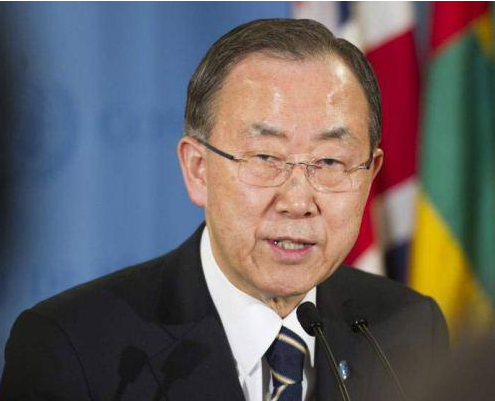Ban Ki-moon’s ‘principled pragmatism’ at UN failed Haiti’s cholera victims
china.org.cn / chinagate.cn by Earl Bousquet, January 16, 2017 Adjust font size:

Now that Ban Ki-moon is no longer U.N. secretary-general, the former South Korean foreign minister is widely seen in Seoul as having his eyes clearly set on becoming the country’s next president.
His entry to the presidential campaign is seen as a mere formality, only the timing yet to be settled. The national press has already placed him miles ahead of the other three top candidates from the main opposition parties.
The ex-U.N. chief is being courted by dissidents who broke with President Park Geun-hye’s ruling party to establish a breakaway New Conservative Party for Reform (NCPR), following impeachment proceedings caused by her association with accused influence-peddler Choi Soon-sil.
As with every candidate for the highest political office anywhere, however, Ban has not escaped early scrutiny.
His opponents have already started throwing mud, including allegations of accepting bribes, association with religious fanatics – even of not having enough home-grown experience to attend to the immediate problems of South Korea.
Those lobbying on behalf of and supporting Ban will argue the opposite – that his eight years at the U.N. have given him the knowhow and international connections to address national issues.
For his part, the former U.N. chief has been keeping the world at bay, even while repeating to the press his interest in “serving” his country.
Ban is clearly testing the waters, but he well knows that Korean partisan politics today is miles away from the “spirit of principled pragmatism” that he espoused during his eight years in New York.
Now that the heir to the mammoth Samsung financial galaxy has been named as a bribery suspect in the so-called “Choi-gate” scandal, the plot has thickened to seal President Park’s fate as the latest Korean president to leave office scandal-tainted.
While Ban weighs his bets, and his successor at the U.N., António Guterres, settles into office, the former’s influence and legacy is still being weighed around the world.
There will surely continue to be different assessments of his leadership and the U.N.’s record regarding peace, climate change, poverty reduction, the Millennium Development Goals (MDGs) and reduction of the North-South wealth gap.
However, perhaps the Latin America and Caribbean region’s most sour memory of Ban Ki-moon’s legacy is the U.N. response – or, rather, the lack thereof – under his watch, to the catastrophic cholera outbreak in Haiti several years ago.
The mass outbreak was caused by U.N. peacekeeping troops from Nepal sent to Haiti, claiming thousands of lives and affecting hundreds of thousands more.
Under Ban’s leadership, the U.N. systematically delayed acknowledgement of its culpability; and when it became crystal clear that its troops were indeed responsible, the U.N. invoked “diplomatic immunity” to avoid being sued.
It was not until Ban had virtually packed to leave the U.N. at the end of last year that it eventually acknowledged responsibility.
But the cloak of diplomatic immunity continues to shelter the world body from paying compensation to the multitude of victims’ families in what is still the poorest nation in the Western Hemisphere.
Cholera is still a serious health problem in Haiti today, and concerns about its spread resurface with each annual rainy or hurricane season.
By the time he makes his mind up about when to make his presidential campaign announcement, Ban will have left behind in New York his ultimate responsibility for the U.N.’s failure for the Haiti cholera victims and their families in a U.N. member-state.
By that time, North Korea and domestic election politics will be more immediate problems on his mind, including possibly engaging China in a search for de-escalation of Seoul’s historical tensions with Pyongyang and Tokyo.
China has just issued a White Paper on Asia-Pacific Security calling for "discretion" by the U.S. and South Korea in the deployment of the THAAD anti-ballistic missile system on the peninsula.
The document says this is “detrimental to strategic stability, mutual trust and the strategic security interests of China and other countries” and China therefore “strongly urges” the U.S. and South Korea to stop this process.
Knowing this, Ban may also now be wondering how to encourage Washington, under the new administration of President Trump, to shift gears in searching for a peaceful solution to the problems between the two Koreas.
But as far as the Caribbean, in particular, is concerned, the U.N.’s patent failure to take responsibility and atone for the highly fatal cholera outbreak in Haiti will continue to follow Ban forever, as memory cannot be erased and consciences have a way of haunting eternally.
Earl Bousquet is a contributor to China.org.cn, editor-at-large of The Diplomatic Courier and author of an online regional newspaper column entitled Chronicles of a Chronic Caribbean Chronicler.